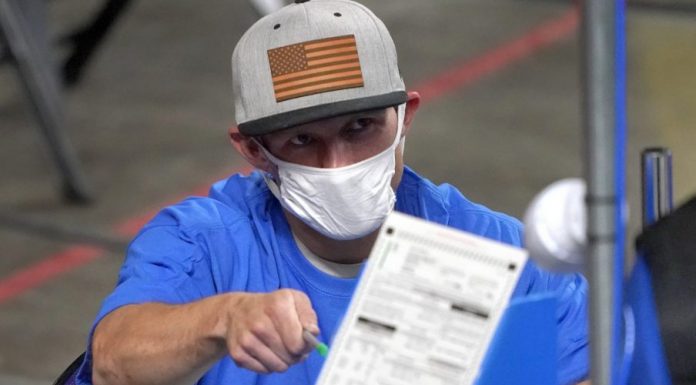(Joshua Paladino, Headline USA) Arizona Attorney General Mark Brnovich‘s office demanded that the Maricopa County government hand over voter signature files and registration records as part of its investigation into election fraud, the Western Journal reported.
Assistant Attorney General Jennifer Wright submitted the request in response to the Election Systems Integrity Institute’s study that found more than 200,000 mismatched signatures.
“In the study, it is alleged that over 250 of those sampled ballot affidavits contained signatures that did not appear to match the voter’s signatures,” Wright wrote.
In the March 9 letter, Wright noted that this was the office’s third request for information.
Looks like Maricopa BOS doesn’t want to comply with AG’s request for documents. What are they hiding now? pic.twitter.com/Ar7XQlxj9T
— Karen Fann (@FannKfann) March 20, 2022
Systems engineer Shiva Ayyadurai, an MIT graduate, led the ESII’s study. In 2021, he testified before the Arizona Senate that the Maricopa County 2020 general election audit found at least 17,000 duplicate ballots and up to 55,000 illegal votes.
Maricopa County said the apparent duplicate ballots came from the curing process, in which election officials send ballots back to voters so that they can add a signature verification or correct some other error on their ballot.
Once voters returned the ballots, they looked like duplicates, though Maricopa County maintains that they were not counted twice.
The ESII’s study claimed that Maricopa County should have cured at least 11.3 percent of the county’s 1.9 million mail-in ballots—about 215,000 total ballots in total. The county only sent 1.31 percent—about 25,000 ballots—back to voters to cure.
Maricopa County admitted that it needed to cure “upwards of 25,000” signatures.
Of those that the county sent for curing, only 587 ballots—or 0.03 percent of the 1.9 million votes cast—were rejected.
“I found it fascinating that they didn’t give us an exact number. They just said up to 25,000,” Ayyadurai told The Western Journal, adding that the county claimed it performed a “rigorous signature verification process.”
Ayyadurai said that the county should have one approved ballot for each cured ballot, “which means you should know exactly how many were cured.”
“Why did you say, ‘Upward of 25,000?’ Because we found out exactly 17,126 were duplicate images, that means we definitively know how many were cured.” he said.
“Why isn’t the county saying exactly how many were cured?” he asked.
Ayyadurai’s study arrived at these figures by checking 2,700 ballot envelope signatures against each voter’s signature on file with the Maricopa County Recorder of Deeds. More than 250 signatures did not match.
Megan Gilbertson, communications director for the county’s Elections Department, said that the ESII could not have accessed the ballot envelope signatures.
“Voter signatures and ballot envelopes are not public record,” she said.
“We have not released this protected voter information to any organization other than the Arizona Senate as required.”
Ayyadurai claimed that Maricopa County did not even give the Arizona Senate its signature files, so it is unclear how the group analyzed the data.
To check ESII’s claims, Wright requested “copies of all the signature exemplars in the voter’s registration file” and documents about the county’s signature verification process.
Trump praised the Attorney General’s office.
“Now is finally the time for the Arizona Attorney General to issue warrants and take his investigation to the next level,” he said.

